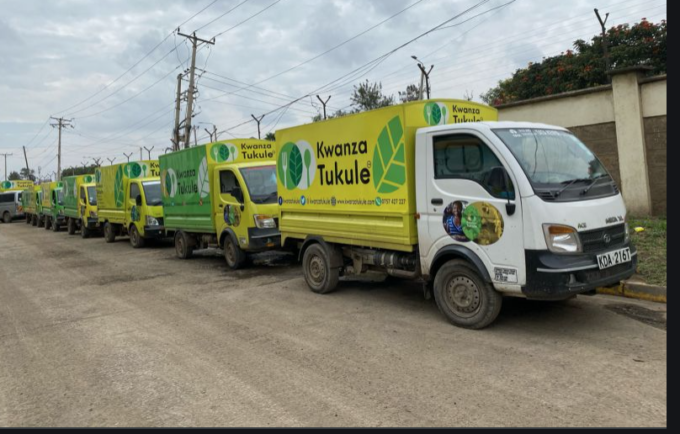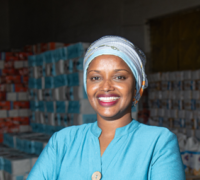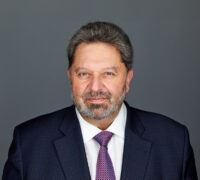TIME’s first female CEO plots course for the future
Jessica Sibley, CEO of TIME, explains to Jean-François Manzoni how she is transforming the 100-year-old media brand into a company that can remain relevant in the digital age....
YouTube
December 20, 2022 in Videos
Building a social enterprise requires both a big heart and a clear strategic focus, says Khadija Mohamed-Churchill, founder and CEO of Kwanza Tukule. In an in-depth discussion with Jean-Francois Manzoni, she reveals...
In Nairobi’s industrial area, motorcycles piled high with bright yellow plastic tubs zip through the early morning traffic to deliver food staples like flour, cooking oil and pulses to women who have set up makeshift stalls to cook meals for low-income workers. The street food vendors place their orders the day before via an app and pay for their purchases with mobile payment system M-Pesa.
This tech-enabled business-to-business food distribution service was the brainchild of Khadija Mohamed-Churchill, who founded Kwanza Tukule (which means “first, let’s eat” in Swahili) to address the lack of affordable and nutritious food for people living in Kenya’s growing informal settlements.
Born and raised in Kenya, Mohamed-Churchill worked for a bank before moving to the UK to do an MBA at Imperial College, London. After graduating, she worked for 11 years in various tech consulting roles. When she traveled back home she was struck by the challenge faced by many Kenyans in finding affordable food and began asking herself why the food issue hadn’t been solved.
An estimated 10 million Kenyans routinely experience hunger. With ever larger numbers moving to urban areas and ending up in informal settlements where they lack the space to cook, street food vendors have become an increasingly important source of food and nutrition.
On returning to Kenya, Mohamed-Churchill worked for an NGO before realizing she could use her skills, experience, and MBA training to create a more efficient and effective supply chain for the street food industry.
From the outset, Mohamed-Churchill had strategic clarity about the customers she wanted to serve. “We are very militant about understanding what the customer needs so we can stay profitable,” she said. “We’re impactful and we can prove that these kinds of models work. We care so much, and if you care so much then you do the extra work that most people might not be willing to do.”
We care so much, and if you care so much then you do the extra work that most people might not be willing to do- Khadija Mohamed-Churchill
Founded in 2018, Kwanza Tukule originally started by pre-boiling raw food such as lentils and pulses, which take a long time to cook, and then supplying them to vendors. They have since shifted to supplying food staples, addressing their customers’ needs by delivering daily, allowing them to pay as they go, and taking small orders, since many vendors lack storage.
“It’s not like a shop,” Mohamed-Churchill explained. “Sometimes it’s just under a tree, sometimes it’s behind a building.” The reliability, convenience, and regularity of the service eliminates guesswork for their customers and saves them time and money since they no longer have to get up early to take a motorcycle taxi to the store.”
To earn customer loyalty, Kwanza Tukule also provides employment. “Whenever we have recruitment […] we ask our customers, ‘Do you have anyone looking for work?’ And then we employ in the areas they live, because then they don’t spend a lot of money on transportation, they know the local people and we get more loyalty that way,” she said.
Technology also helps a great deal. Customers pay and order via an app, allowing Kwanza Tukule to consolidate orders and plan its delivery routes. The app also helps the company to manage its stock, predict supply and demand, and ensure suppliers are paid on time.
Building a social enterprise is not without its struggles. One of the biggest challenges has been hiring a committed team when she can’t offer them high salaries or a fancy office with computers.
“Initially, you don’t have too much you can offer, so you have to work harder to paint the picture of what the future could be like […] It’s time consuming!” Mohamed-Churchill explained.
Through a mix of trial-and-error, she has learned to find out what motivates people and recognizes that this might be different to what motivates her. “But it’s crucial that you have people who are committed in the beginning, or at least get rid of the people who aren’t […] because the commitment is what drives you through the start.”
The child of a shopkeeper, entrepreneurship was a natural path for Mohamed-Churchill. “In class, if I was asked a mathematics question, maybe I’d struggle. But if the teacher used an example of buying a banana and then selling it, and asked, ‘What’s the profit?’ I would be first with my hands up,” she recalled.
Reflecting on her approach to running a social enterprise, Mohamed-Churchill says she has a laser focus on customers. Every day she checks in with her chief operating officer to see how the company is performing with existing customers and how many new customers they are adding. Her second strategic priority is to keep track of suppliers, many of whom are grateful that she is catering for a demographic they hitherto have been unable to reach. The rest of her day is punctuated by calls to the sales team and investors.
With plans for Kwanza Tukele to expand to other cities in Kenya and Africa, Mohamed-Churchill anticipates that her daily work pattern will increasingly shift away from day-to-day operations to becoming more of a visionary leader, focusing on acquiring strategic partners and developing a model that can be rolled out in different locations.
It's good that we are doing good, but it's also important that it's sustainable. That at some point it's profitable- Khadija Mohamed-Churchill
The transition is bittersweet for Mohamed-Churchill, who is energized by her interactions with customers. “I don’t visit them on a daily basis now, but when I drive to work, I usually stop to have a chat and eat,” she said. “The customers that we serve don’t just provide food. They’re like a therapist, they listen, they laugh, they joke, they challenge.”
So, what is her advice to future social entrepreneurs? “Think about the long-term viability of the business. It’s good that we are doing good for customers and the community, but it’s also important that the business be sustainable in time, which requires it to be sufficiently profitable.”
Secondly, she advises bringing in the right partners. Mohamed-Churchill decided to pitch to investors rather than apply for grants because she wanted people who would hold her accountable.
One such partner has been the elea Foundation for Ethics in Globalization, which exists to help fight poverty using entrepreneurial means. When Mohamed-Churchill was just starting out and didn’t yet have a management team, elea helped her with everything from recruitment to growth plans and by providing financial support and helping to attract other investors.
“Attracting investors is a special skill, even for someone who lived outside Kenya for over 10 years and was a banker,” she said. “So to open the doors for Kwanza Tukele is incredible.” Now, she says the other businesses within the elea network act as a mutual support system by sharing their knowledge.
Does she have any specific advice for female entrepreneurs? “Know your numbers,” she said. “Because there’s a gender bias that women might not know the business well. So show that you do.”
Mohamed-Churchill also spends a lot of time using numbers to highlight the value in catering to female-run businesses. Data is also something that entrepreneurs should collect to convince themselves about the viability of their business model so they can convince others, she said.
“If it really doesn’t work, then you have to be honest with yourself because no one else will tell you. People will avoid telling you and will instead encourage you to come see them again next week. But then you’ll keep meeting them, they won’t be writing the check and you’ll be wondering, ‘why are people not investing in me?’ So you have to face reality and use the failure to improve your business model. Through it all, you must also continue to believe in yourself because people for sure won’t believe in you if you don’t.”

Unlike many entrepreneurs who start a business with ambitions to get rich, Mohamed-Churchill admits she isn’t motivated by material wealth. “I don’t particularly like houses or cars or nice handbags,” she said. “That doesn’t mean I want to live under a bridge and be poor because I don’t. But it does mean that I don’t need or want to consume unnecessarily to make myself feel good. What really matters to me is making a connection with people and making a difference in their lives. It is solving a problem that people and society need to be solved, and ideally doing so in a way that people don’t even notice that they are being helped.
“If you speak to our customers, they don’t even know that Kwanza Tukule is an ‘impact business’. They’ll just tell you, ‘They’re so great. I need them’. And I think we meet them halfway because we need them, they need us. So it’s kind of like a relationship of equals.”
Her focus right now is validating the business model before it is scaled nationally and internationally, displaying some of the drive that has helped her grow Kwanza Tukele to 60 employees in under four years.
“With technology, we can take what we’ve done and replicate it elsewhere,” Mohamed-Churchill said, describing how the people the company serves – manual laborers who work hard but lack the space to cook – can be found almost everywhere in developing countries.
“This is a problem that’s going to continue and get even bigger. Now, Kwanza Tukule what does it do? In a small way that’s what we are doing, we start with a model, then we want to bring in partners. There are people out there with resources, with even more enthusiasm than I have to breathe life into stuff that others have started. And that’s what we want to do.”

Founder and CEO of Kwanza Tukule
Raised in a mostly Muslim, poor, rural area in Eastern Kenya. Studied at Imperial College, London, and the University of Nairobi. Worked as transformation and IT consultant in banks in Nairobi and London for 11 years. Moved back to Kenya in 2017 and did voluntary work for NGOs in low-income areas of Nairobi. Founded Kwanza Tukule in 2018, a last-mile distribution business that supplies informal street vendors in Nairobi.

IMD President
Jean-François Manzoni is the President of IMD, where he also serves as the Nestlé Professor. His research, teaching, and consulting activities are focused on leadership, the development of high-performance organizations and corporate governance.
December 12, 2023 in CEO Dialogue Series • 8 min read
Jessica Sibley, CEO of TIME, explains to Jean-François Manzoni how she is transforming the 100-year-old media brand into a company that can remain relevant in the digital age....
November 14, 2023 in CEO Dialogue Series • 9 min read • 
Henrik Andersen discusses with IMD President Jean-François Manzoni the challenges of navigating supply chain disruptions and soaring raw material costs over the past three years, and why he changed the wind farm...
October 17, 2023 in CEO Dialogue Series • 9 min read • 
Regenerative agriculture techniques are vital to improve the resilience of crops and help farmers achieve humanity’s dual objective of growing more food using less land, the CEO of Syngenta says....
September 19, 2023 in CEO Dialogue Series • 8 min read • 
Dilhan Pillay, CEO of Singapore’s global investment giant Temasek, discusses with Jean-François Manzoni the importance of a carbon tax and how his company is working to ensure ‘every generation prospers’ without sacrificing...
June 6, 2023 in CEO Dialogue Series • 9 min read • 
Mostafa Terrab, CEO and Chairman of the Board of the Moroccan fertilizer group OCP, explains to IMD President Jean-François Manzoni how sincerity of intent helped him gain the trust of his people...
March 21, 2023 in CEO Dialogue Series • 9 min read • 
Antoine de Saint-Affrique, in a frank and open discussion with IMD President Jean-François Manzoni, explains his no-nonsense approach to problem-solving, the importance of speaking the truth, however uncomfortable, and knowing when it’s...
February 22, 2023 in CEO Dialogue Series • 9 min read • 
Mickey Mikitani tells IMD President Jean-François Manzoni how he has grown Rakuten from an e-commerce startup into an ecosystem spanning internet services, fintech, and mobile....
January 3, 2023 in CEO Dialogue Series • 9 min read • 
The Wallenberg sphere operates in about 180 countries and its holdings generate a total of $160bn of annual revenue. But Marcus Wallenberg, chairman of the family holding company, explains to Jean-François Manzoni...
December 20, 2022 in CEO Dialogue Series • 10 min read
Building a social enterprise requires both a big heart and a clear strategic focus, says Khadija Mohamed-Churchill, founder and CEO of Kwanza Tukule. In an in-depth discussion with Jean-Francois Manzoni, she reveals...
November 15, 2022 in CEO Dialogue Series • 8 min read
Jean-Pascal Tricoire, CEO and chairman of Schneider Electric, tells IMD President Jean-François Manzoni how decentralization drives his corporate thinking....
Explore first person business intelligence from top minds curated for a global executive audience